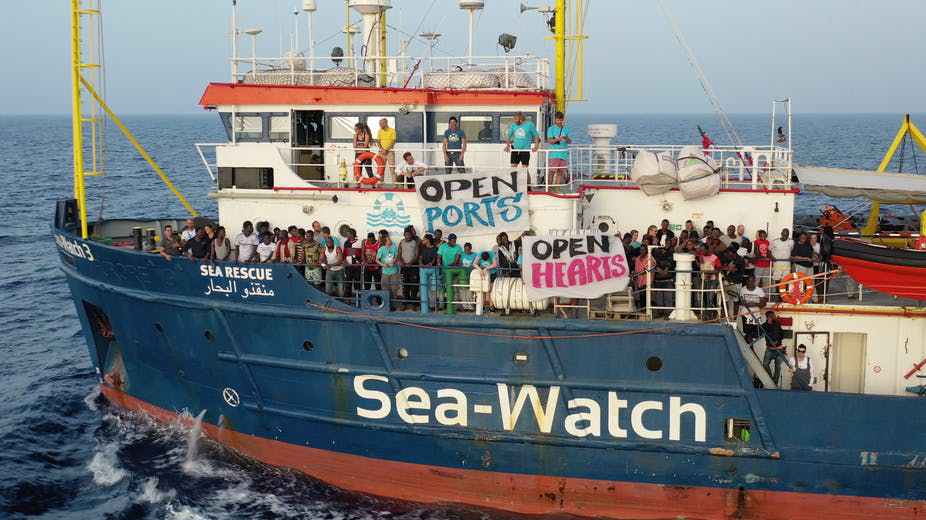Solidarity: crime in the making

Eleonora Catenaro, BA Social Anthropology and Arabic
It is June 2019, 53 migrants departing from Libya have been waiting for weeks on the board of the ship of the German NGO Sea-Watch. The summer heat is taking a toll on people, as is the lack of food and water.
In the meantime some kilometres away, heads of the Italian government have already comfortably decided to forbid the NGO to drop anchor in the southern Italian port of Lampedusa. Instead, this anchorage has been advertised as a punishable crime. According to the Italian government, it is completely justified to send them back to civil war-torn Libya.
In the sea of endless wait and uncertainties about migrants’ futures, Sea-Watch’s German activist Carola Rackete resiliently decided to dock on Italian soil, despite the intense disagreement of the Italian authorities. She rejected the walls of ‘Fortress Europe’ and completed her mission of helping people reach the land they left their homes for.
The rise of anti-migration laws in Europe transforms humanitarian workers like Carola into heroes of activism because of their positions as righteous people in times of extreme hostility against migrants.
“Her desire to save lives became a crime whose supposed victims are the Italian state and its people”
Believe it or not, Carola was held accountable for her action of solidarity. Her desire to save lives became a crime whose supposed victims are the Italian state and its people. She was accused of encouraging ‘illegal’ migration under the security bill passed a month before the event. Under this bill, the supposed threats to national security – the vessels that bring migrants to shore – would risk fines up to 50 thousand USD.
The far right-wing leader Matteo Salvini was coordinating all of this from afar, sitting in his armchair in the Ministry of Interior. The new bill authorised him and his cabinet to deny any access of Italian waters to ships suspected of opposing Italian immigration laws.
Clearly, this bill is directed at NGOs, criminalising their missions of rescue at sea. Several UN experts have severely condemned Salvini’s security bill due to its breaching of article 98 of the UN Convention on the Law of the Sea, which confirms the humanitarian responsibility of helping any endangered person at sea (not to mention the complete aberration of International Human Rights Law).
As unsurprising as this can sound, Italy is not alone in its right-wing strategies on immigration. Amnesty’s 2020 report denounces the epidemic of restrictive anti-migration laws across Europe, that includes punitive and sanctioning measures against people who defend the human rights of migrants and refugees.
Despite the punitive risks, many humanitarian groups and workers like Carola Rackel persist in putting their lives on the line for others. Among the many prominent examples are the activists Seán Binder and Sarah Mardini who risked up to 25 years in prison for volunteering in a rescue centre in Lesvos Island, Greece.
Another example is the Croatian NGO Are You Syrious, who are a constant target for the Croatian government for supposedly encouraging illegal migration. Youth activists, priests, mountain guides, or any person who performs acts of solidarity in welcoming newcomers also immediately place themselves as a target against the government.
Criminalisation for activism sounds very close to what is intended by the new Nationality and Border Bill suggested by the UK’s Home Secretary Priti Patel. On 27 January 2022, the bill will pass its last stage – the Committee stage – and will threaten the prompt removal of British citizenship in case of non-compliance to the prescriptive but extremely vague guidelines.
These guidelines criminalise undocumented arrivals in the UK and the activism that supports them, as well as activism that does not comply with government rules. The structural racism enrooted in the British government implies that this unfairly targeted new law is at the expense of many people of Caribbean, African and Asian descent.
The UN is condemning the UK for the omission of its protection duties of migrants and asylum seekers, and exposes the violation of Human Rights as the obvious aftermath of such damaging law.
Solidarity is not seen as a natural human emotion anymore. It has become a dangerous tool to facilitate undocumented migration if we listen to the local news in many European countries.
Migrants’ drive to find a better life will not be halted by armchair leaders’ caprices. Humanitarian workers will continue to use their natural and dangerous solidarity to pursue the goal of their job. For this, we must support their fierce desire to do so.
Photo Caption: The Sea-Watch 3 after weeks of waiting off the coast of the island of Lampedusa (Credit: Sea-Watch handout/EPA)



